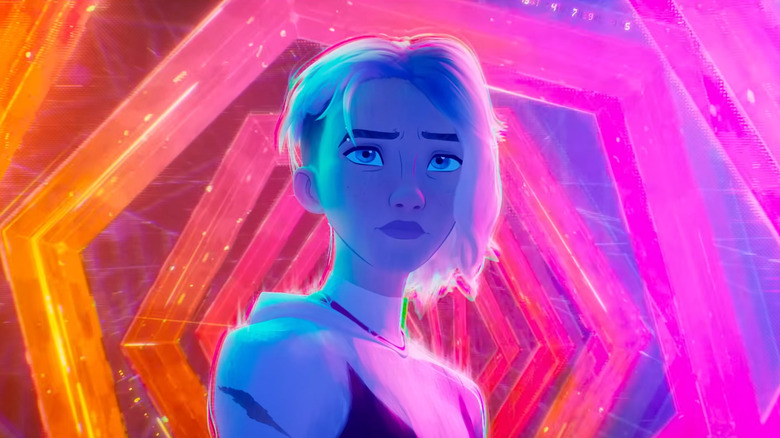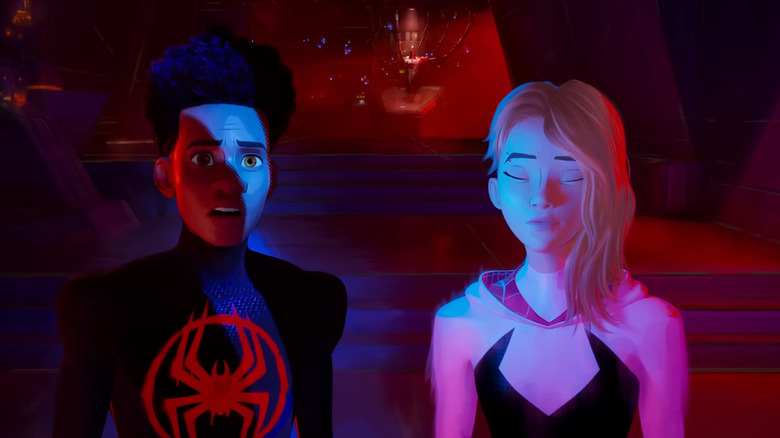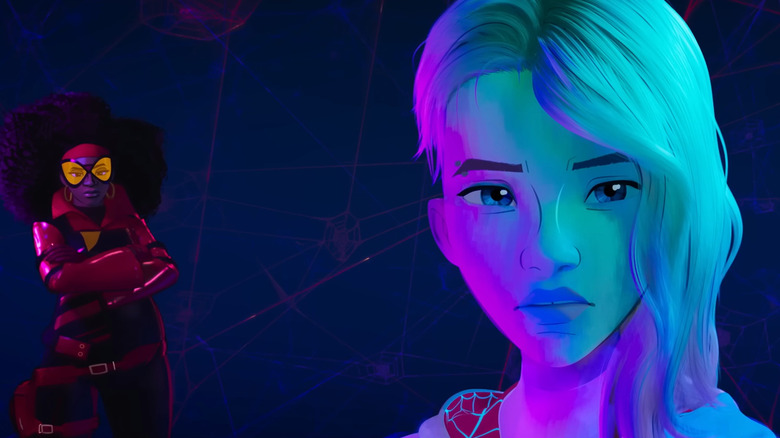Gwen Stacy Is The Not-So-Secret Weapon Powering Spider-Man: Across The Spider-Verse
This post contains spoilers for "Spider-Man: Across the Spider-Verse."
The second and third movies of the Spider-Verse series were originally intended to be titled "Across the Spider-Verse (Part One)" and "Across the Spider-Verse (Part Two)," and from the finished product of "Across the Spider-Verse," you can certainly tell. As brilliant and creative as this movie is, it's very much half of a larger story. Audiences in my theater groaned when that "To be continued..." flashed across the screen, but if we were being honest with ourselves, it was clear throughout the final hour that there was no way everything would be wrapped up by the end of the film.
This is hardly the first major blockbuster in recent years to pull this trick, to be a "Part One" type of movie without including any "Part One" in its title. The marketing for 2021's "Dune" certainly could've been a little clearer about how they were only adapting the first half of the novel, just like it would've been nice if the recent "Fast X" could've done more to warn us that this was part one of a two (three?) part story.
The problems inherent with many "Part Ones" are also often found in the middle installments of trilogies. As beloved as "Empire Strikes Back" is today, it also got a lot of flak back in 1980 for not resolving so many of its plot threads, and even though "Catching Fire" is generally considered the best of the "Hunger Games" movies, the popular complaint that it was just a trailer for the "Mockingjay" films has never really gone away. Most people can deal with cliffhangers in TV, but cliffhangers in movies are a bit harder to swallow. Luckily, "Across the Spider-Verse" had one key character to help ease the blow.
Not the main character, but almost
Although Miles is still very much the protagonist of this series, you certainly wouldn't know it from the way this movie opens. It starts off not with Miles narrating to us about his life, but with Gwen, AKA Spider-Gwen, AKA Spider-Woman, dealing with her own problems. She's fighting her own villains and dealing with a troubled relationship with her father (a police officer, like Miles' dad), which only gets worse when she's forced to reveal her true identity to him before she's ready. When her father tries to arrest her despite her pleas, it's heartbreaking, not just because of what this means for Gwen but because of what this implies for Miles, who will spend most of this movie struggling to figure out whether to tell his parents about his own alter-ego.
Although the movie returns to Miles' perspective after this opening, Gwen is still the main person driving the plot for large sections of the film. She's the one who chooses to meet up with Miles even though she knows she's not supposed to, and who tries to stop Miles from interfering in Pavitr Prabhakar's canon event. Although the second half of the film is driven by Miles' choice to still save his father regardless of the massive potential repercussions, it's Gwen who changes the most throughout this period. She changes her mind, is forced back to her own universe, then finds her way back into the multiverse to help Miles save his dad. She also manages to patch things up with her own dad while she's at it. "Across the Spider-Verse" might not conclude a whole lot with Miles' arc, but Gwen's arc gets a full beginning, middle, and end.
Avoiding previous franchises' missteps
This movie has already gotten comparisons to "The Matrix Reloaded," the controversial second installment of the "Matrix" franchise that also ended with a major cliffhanger. There are plenty of differences between the films, but Gwen's arc is probably the biggest one. In "Reloaded," Trinity was given plenty to do, but she was still very much a secondary character to Neo. She didn't have much of her own storyline outside of him, and there's not much sense that Trinity's grown and changed throughout the movie. She was cool in the beginning, and she's cool at the end.
"Reloaded" was also a lot harder to forgive because so many of its plot points only worked under the assumption that it was leading somewhere good, and when "Revolutions" failed to deliver to many viewers, the reputation of "Reloaded" suffered as well. That won't be as big of a problem with "Across the Spider-Verse," however, because Gwen's character arc works just as well on its own as it does as part of a trilogy. With Gwen at least, there's not much "Beyond the Spider-Verse" can do to undermine the emotional, satisfying arc that Gwen's gotten. "Across the Spider-Verse" might be half a story, but it's got a wonderful, complete story for Gwen contained within, and no potential missteps in the next movie can ever take that away from that.
"Spider-Man: Across the Spider-Verse" is now in theaters.


